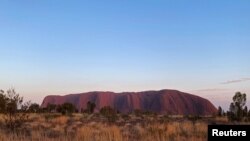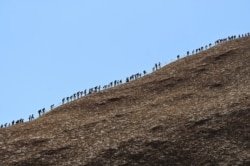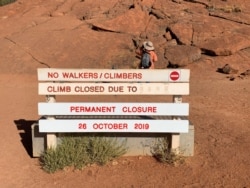The world famous climb to the top of Uluru, the sacred red rock in central Australia, has permanently closed. Indigenous people have long asked tourists not to walk on the ancient sandstone monolith because of its spiritual significance. But the closure of the climb is not universally popular.
Thousands of visitors have poured into the Uluru national park in recent weeks for the chance to reach the summit of the namesake monolith one last time.
It closed Friday at the request of indigenous leaders, who believe the rock is of immense cultural importance. They believe it is sacred, and has a power and a spirituality like nowhere else.
Donald Fraser, an Aboriginal elder, is relieved the climb is closing.
"The burden will be lifted as of today, as I am speaking. I can feel it. Now is the time for the climb to have a good rest and heal up," he said.
Aboriginal groups have long asked visitors to the site in the central Australian desert not to scale Uluru for cultural reasons. The rock is 348 meters high, and is taller than the Eiffel Tower in Paris.
But some of the last tourists to reach the summit were happy to disregard the wishes of the local indigenous community.
"I understand it is a sensitive topic. My view is that Australia should be for all Australians. So I have got no problem at all with people climbing the rock and I think it is a natural human instinct to see something like that and want to climb it," a climber said.
In 1985, control of the rock was handed back to Aboriginal people by the Australian government.
Authorities believe that closing the climb will not damage the local tourism industry, which is vital to this remote part of the country.
The number of people climbing the rock has fallen in recent years, according to Mike Misso, the manager of the Uluru-Kata Tjuta National Park.
"Over many years, the number of people wanting to climb has actually declined. And before the climb closure was announced, it was less than 10% who actually climbed Uluru, so the numbers, say, 20 years ago there were probably about 30% who wanted to climb and climbed, whereas the numbers have been declining over the last few years anyway," he said.
It is not universally popular, but closing the climb will bring to an end years of distress for Aboriginal people.







